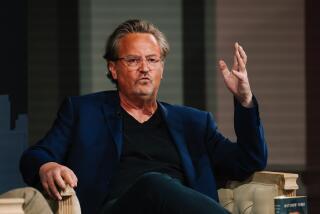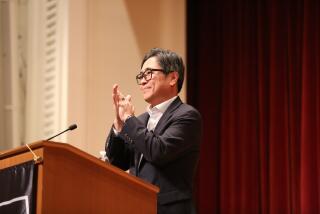Gerald Locklin, Long Beach poet and defining West Coast literary voice, dies
- Share via
Known by many as the preeminent poet of Long Beach, Gerald Locklin was perhaps even more esteemed among those who knew him as Professor.
Over half a century, Locklin was a defining literary voice on the West Coast and beyond as a writer of poetry, fiction and essays, tracing an evolution from hard-drinking, bear-like bacchanalian to gray, slender, sober — and ever free-spirited — elder statesman of letters. Poet Charles Bukowski’s long-ago praise of him as “one of the great undiscovered talents of our time” has been eclipsed by the years: Locklin published some 150 books and thousands of poems, many in translation and studied and admired around the world.
And as an erudite and gregarious Cal State Long Beach professor of literature and creative writing, Locklin was widely beloved by students and colleagues alike. From 1965 to 2007, he taught and nurtured thousands of students, inculcating a love, appreciation and celebration of the written and spoken word. He was crucial in helping transform a commuter state college into a destination for aspiring writers, and he propelled the careers of generations of poets, novelists, journalists and college instructors.
On Jan. 17, Locklin died of complications of COVID-19 at Kaiser Permanente’s Irvine Medical Center, one month before his 80th birthday.
“I can tell you that Gerry was one of the kindest, most generous and accessible humans I’ve ever met,” said Los Angeles poet S.A. Griffin, who had known Locklin since the 1980s. “Gerry’s legendary presence was felt in Southern California, the Southwestern U.S., across the U.S. and across the oceans.”
Taking root in the little magazines and small presses of the late 1960s and flourishing in them through the decades, Locklin’s poetry focused on the everyday, even the banal, which he often rendered memorable in verse that was direct and clear, typically concise and playful — and at times very funny. Locklin poems were periodically featured on Garrison Keillor’s syndicated radio program “A Writer’s Almanac” and in the pages of the Los Angeles Times.
Locklin was championed early on by the Wormwood Review, and he would become indelibly associated with the celebrated literary magazine by the time it ceased publication in 1999. He was himself the longtime poetry editor of the Chiron Review. His poetry collections, by a multitude of publishers, included “The Firebird Poems,” “The Life Force Poems” and the early underground classic “Poop and Other Poems.” He enjoyed something of a mini-bestseller with the 1984 novella “The Case of the Missing Blue Volkswagen,” a clever, hilarious cross between detective novel spoof and metafictional reverie, which he followed with two sequels.
In one of his better-known poems, “The Iceberg Theory,” he exalts the unappreciated virtues of iceberg lettuce, while upbraiding food and literary critics: “All the food critics hate iceberg lettuce,” he begins — “you’d think romaine was descended from / orpheus’s laurel wreath.”
When writing about couples he could be brutally blunt, even severe. Yet he had a streak of sweet melancholy, especially in poems about his children. In “No Longer a Teenager,” about his grown daughter’s visit home, he concludes: “literature and opera are full of / characters who die for love: / i stay alive for her.”
Locklin delighted in performing for an audience, which he did regularly for decades in and around Long Beach, turning the poetry reading into a festive and raucous event, punctuated by his signature song-and-dance finale. He co-founded a minor literary movement known as the Stand Up Poets, for whom a poem’s performability and humor were as important as its language and cadence.
As a teacher Locklin brought to the classroom an encyclopedic knowledge of literary history — and many subjects intersecting — which he shared with an enthusiasm, amiability and humor that made him a perennial campus favorite.
“He was the true essence of the renaissance person,” said Eileen Klink, Cal State Long Beach English Department chair since 1996 and a faculty member for nearly 50 years. “But above all he was a person of the people. ... His concerns were always with the students.”
Born Feb. 17, 1941, in Rochester, N.Y., Locklin attended the College of the Holy Cross on a football scholarship before returning to his hometown, where he earned his bachelor’s degree in literature from St. John Fisher College.
By then, he’d had his fill of Rochester and the Eisenhower years, so he ventured west, to the University of Arizona, where he earned his master’s and PhD. From there he moved to Los Angeles, where he landed his first teaching job at Cal State L.A. in 1964. The next year he joined what’s now California State University, Long Beach, where he taught for 42 years.
Locklin had long endured heart and lung ailments, and developed dementia in the last couple of years. When the pandemic struck in March, his family moved him to Sunrise of Huntington Beach, an assisted living center. The facility was free of coronavirus infection until December, when two people tested positive. Locklin and the other residents were tested for the virus, and he was negative. Then on Jan. 4, he experienced severe breathing problems, and his daughter Vanessa rushed him to Kaiser in Irvine. He was tested again, and was positive.
When the family established him at Sunrise in March as the pandemic was taking hold, it seemed the necessary move, said his son Zachary, an English professor at Cal State Long Beach. At that time, Locklin was receiving round-the-clock in-home care, and the family feared exposing him to a changing rotation of outside caregivers.
“It’s unfortunate, because one of the benefits of getting him in the assisted living facility was we figured it would be safer from COVID,” Zachary said. “We were thinking at the time, thank goodness. ... That seems to have really paid off for nine or 10 months.”
Two weeks after arriving at Kaiser — and two weeks away from receiving his first dose of COVID-19 vaccine — Locklin died on a Sunday morning.
In addition to Zachary and Vanessa, Locklin leaves behind his wife, Bobbie; five children from two previous marriages: James, Heidi, Rebecca, Blake and John; 13 grandchildren and four great-grandchildren.
More to Read
Start your day right
Sign up for Essential California for the L.A. Times biggest news, features and recommendations in your inbox six days a week.
You may occasionally receive promotional content from the Los Angeles Times.






